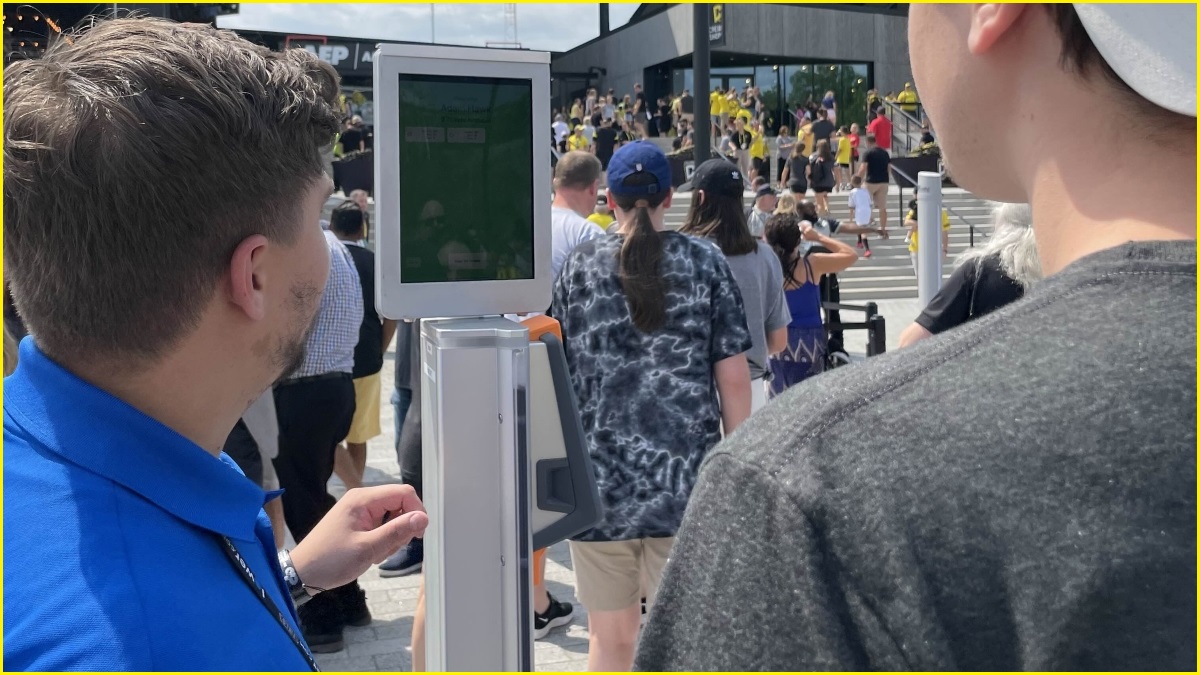The Australian Open (AO) has rolled out facial recognition expertise for all guests beneath a brand new addition to its circumstances of entry.
By buying a ticket or getting into Melbourne Park for this 12 months’s competitors, which runs January 6-26, guests acknowledge safety cameras “which will incorporate facial recognition expertise” are used to “improve safety and patron security” in and round event grounds.
The expertise, which was not accounted for in final 12 months’s phrases, has sparked considerations from some attendees and privateness consultants.
An AO attendee stated that regardless of having bought a ticket and entered the occasion, they weren’t conscious they’d consented to the expertise.
“We positively didn’t learn the phrases and circumstances of the tickets — who does?” they stated.
“We weren’t conscious of any of this.”
Separate to the brand new surveillance tech, occasion organiser Tennis Australia has additionally launched opt-in software program to facilitate sooner queuing at AO entry gates.
Supplied by US-based firm Wicket, this system permits patrons to skip lengthy queues by importing a selfie and linking it to their Ticketmaster account, which might in flip be used for facial scanning at Melbourne Park.
Wicket chief working officer Jeff Boehm advised 9 photos taken by the software program have been transformed right into a “mathematical illustration”, which was then saved in a safe cloud system owned by Tennis Australia.
Info Age requested Tennis Australia how lengthy it saved any collected knowledge and whether or not it was used for functions apart from enabling sooner entrance to the AO, however didn’t obtain a response by press time.
Doubtful consent for surveillance tech
Monash College professor Mark Andrejevic stated the adoption of facial recognition surveillance expertise pointed to a bigger difficulty round consent.
“What’s occurring is similar to what takes place on-line: someplace, nestled in a thicket of verbiage that it’s important to comply with, is the truth that you’re consenting to being scanned,” he stated.
“However what’s your alternative? If you wish to go to the tennis, it’s important to comply with the phrases.
“I don’t assume this counts as significant consent, and for the reason that phrases don’t say how lengthy Tennis Australia goes to maintain the photographs or what they may do with them down the street, it’s probably not knowledgeable consent both.”

Australian Open organisers are additionally utilizing facial recognition tech from Wicket, seen right here getting used within the US, to hurry up occasion entry. Photograph: Wicket / Equipped
The circumstances of entry word that alongside CCTV, facial recognition expertise could also be used to assist determine and eject individuals who’ve been denied entry to the AO, together with for the sake of security, safety or the “integrity” of the occasion.
Whereas the expertise might also be used for regulation enforcement functions and phone tracing on the event, Andrejevic urged organisations have been more and more adopting facial recognition instruments as a way of information harvesting.
“It’s turning into fairly clear that entities of all types wish to use facial recognition — it’s in step with the purpose of vacuuming up as a lot knowledge as doable,” he stated.
First Bunnings, now the tennis
The AO’s adoption of facial recognition expertise comes simply months after {hardware} big Bunnings was discovered to have breached Australians’ privateness by gathering delicate info by related measures.
On the time, Privateness Commissioner Carly Type stated use of the expertise disproportionately interfered with the privateness of everybody who entered Bunnings shops.
Going through nationwide blowback, Bunnings shared a group of CCTV displaying assaults towards its workers, with managing director Mike Schneider arguing facial recognition was a “actually essential asset” for stopping in-store violence.
Notably, the commissioner alleged Bunnings had collected people’ info with out consent, whereas the AO has explicitly garnered attendee permission through the event’s new entry phrases.
Andrejevic urged that as a result of facial recognition expertise is “turning into cheaper and extra highly effective”, firms will likely be extra prone to undertake it.
“Until we get some form of devoted laws governing the usage of the expertise — or some particular provisions within the revamp of the Privateness Act — we will anticipate this to change into the brand new regular in a number of venues,” he stated.

